TBK1 Recombinant antibody
TBK1 Uni-rAbTM Recombinant Antibody for WB, ELISA
Host / Isotype
Rabbit / IgG
Reactivity
human, mouse
Applications
WB, ELISA
Conjugate
Unconjugated
CloneNo.
240769G5
Cat no : 83686-3-RR
Synonyms
Validation Data Gallery
Tested Applications
| Positive WB detected in | HeLa cells, HepG2 cells, HEK-293 cells, Jurkat cells, NIH/3T3 cells |
Recommended dilution
| Application | Dilution |
|---|---|
| Western Blot (WB) | WB : 1:5000-1:50000 |
| It is recommended that this reagent should be titrated in each testing system to obtain optimal results. | |
| Sample-dependent, Check data in validation data gallery. | |
Product Information
The immunogen of 83686-3-RR is TBK1 Fusion Protein expressed in E. coli.
| Tested Reactivity | human, mouse |
| Host / Isotype | Rabbit / IgG |
| Class | Recombinant |
| Type | Antibody |
| Immunogen | TBK1 fusion protein Ag28894 |
| Full Name | TANK-binding kinase 1 |
| Observed Molecular Weight | 84 kDa |
| GenBank Accession Number | BC034950 |
| Gene Symbol | TBK1 |
| Gene ID (NCBI) | 29110 |
| Conjugate | Unconjugated |
| Form | Liquid |
| Purification Method | Protein A purfication |
| Storage Buffer | PBS with 0.02% sodium azide and 50% glycerol pH 7.3. |
| Storage Conditions | Store at -20°C. Stable for one year after shipment. Aliquoting is unnecessary for -20oC storage. 20ul sizes contain 0.1% BSA. |
Background Information
TBK1, also named as tumor necrosis factor (TNF) receptor-associated factor NF-kB activator (TANK)-binding kinase 1 (TBK1), NF-kB-activating kinase (NAK), T2K, is a multimeric kinase that modulates inflammation and autophagy. It is a ubiquitously expressed serine-threonine kinase belonging to the 'noncanonical IkB kinases' (IKKs) recognized for its critical role in regulating type I IFN production (PMID: 27211305). And TBK1 is an important player in yet another critical cellular function, autophagy. This antibody is specific for TBK1.
Protocols
| Product Specific Protocols | |
|---|---|
| WB protocol for TBK1 antibody 83686-3-RR | Download protocol |
| Standard Protocols | |
|---|---|
| Click here to view our Standard Protocols |



